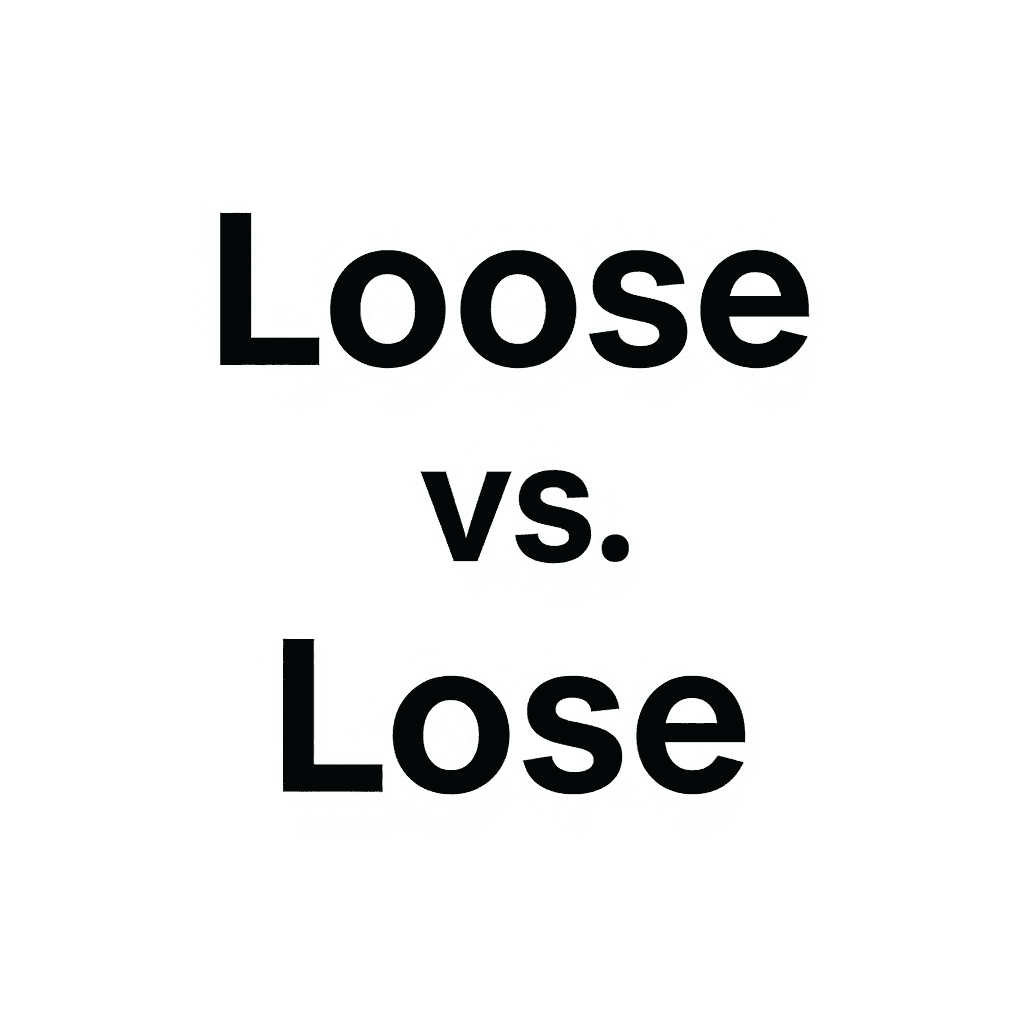“Loose” vs. “Lose”: What’s the Difference?
 The words loose and lose often get confused because they’re spelled almost the same.
The words loose and lose often get confused because they’re spelled almost the same.
But they sound different and have completely different meanings.
Let’s break it down clearly.
Loose: Not Tight or Free
Meaning
“Loose” (pronounced looss) is an adjective that means not tight, free, or not firmly fixed in place.
It can also be a verb meaning to release or set free (though that’s less common).
Examples of “Loose” (10 total)
- The screw is loose — tighten it!
- My shoes are too loose; they keep slipping off.
- She wore a loose dress on a hot day.
- The dog got loose from its leash.
- The door handle feels loose.
- These jeans are looser than the last pair.
- The horse broke loose during the storm.
- A loose thread is hanging from your sweater.
- Don’t let the rope get loose.
- The lid isn’t tight — it’s loose.
🧠 Tip:
If it describes something not tight or free, use loose (with double “o”).
Lose: To Misplace or Not Win
Meaning
“Lose” (pronounced looz) is a verb meaning to misplace, to be deprived of something, or to fail to win.
Examples of “Lose” (10 total)
- Don’t lose your keys again!
- He doesn’t want to lose the game.
- I always lose my socks in the laundry.
- She doesn’t want to lose her job.
- You can lose weight by exercising.
- They might lose their chance if they’re late.
- He didn’t want to lose his temper.
- It’s hard to lose someone you love.
- Be careful not to lose your balance.
- We can’t afford to lose this opportunity.
🧠 Tip:
If it means misplace, fail, or not win, it’s lose (with one “o”).
Quick Comparison Table
| Word | Part of Speech | Meaning | Example |
|---|---|---|---|
| Loose | Adjective | Not tight, free | My shirt is too loose. |
| Lose | Verb | To misplace or fail | Don’t lose your phone. |
How to Remember the Difference
👉 Loose = Not tight
👉 Lose = Misplace or fail
💡 Memory Trick:
“Loose” has two o’s — like shoes that are too loose.
“Lose” has only one — and when you lose, you’ve lost an “o”!
Why People (and AI) Mix Them Up
Since both words look and sound similar, typos happen easily — especially when typing fast.
That’s why Humanizey helps refine AI-generated text by catching small but meaningful spelling differences like loose vs. lose, making your writing natural and error-free.
FAQs
1. Can “loose” ever mean “to lose”?
No. “Loose” is never used to mean “misplace” or “not win.” It only means “not tight” or “set free.”
2. What’s the opposite of “loose”?
“Tight” — for example, These shoes are too tight.
3. What’s the opposite of “lose”?
“Win” — for example, We don’t want to lose the game; we want to win it.
4. Is “looser” a real word?
Yes. It’s the comparative form of “loose” — This shirt is looser than that one.
Practice: Choose the Correct Word (“Loose” or “Lose”)
(Answers are listed at the end.)
- Don’t ___ your temper.
- The screw is too ___.
- I always ___ my wallet.
- My jeans feel a bit ___.
- You’ll ___ the race if you don’t hurry.
- The cat got ___ again!
- I don’t want to ___ my chance.
- The handle on this jar is ___.
- He doesn’t like to ___ arguments.
- Her hair is tied too ___.
Answers
- lose
- loose
- lose
- loose
- lose
- loose
- lose
- loose
- lose
- loose
